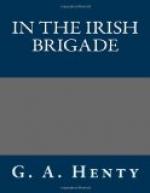“Well, sir, I shall be your debtor for life.
“Do you intend to remain always an exile, Captain Kennedy?” the Earl of Galway went on. “It seems to me little short of madness that so many gallant gentlemen should cut themselves altogether adrift from their native country, and pass their lives fighting as mercenaries. I do not use the word offensively, but only in its proper meaning, of foreigners serving in the army of a nation not their own. Nor do I mean to insult Irish gentlemen, by even hinting that they serve simply for pay. They fight for France mainly in the hope that France will some day aid in setting James Stuart on the British throne; a forlorn hope, for although Louis may encourage the hopes of the Stuarts and their followers, by patronizing their cause, which it suits him to do because it gives him the means of striking at England, by effecting a landing in Scotland or Ireland; it is yet a matter upon which he must be indifferent, save in his own interest, and in the advantage it gives him of keeping in his service some dozen or so splendid regiments, on whose valour he can always rely.”
“That is true, sir,” Desmond replied; “and I own I have no great hope that, by the means of French assistance, the Stuarts will regain their throne. But what could I do if I were to return to Ireland? Beyond the fact that my name is Kennedy, I am in absolute ignorance as to what branch of that family I belong to, and have practically not a friend in the country. Were I to land in Ireland, I have no means of earning my living, and should doubtless be denounced as one who had served in the Irish Brigade. I own that I should be glad to return there, for a time, in order to make enquiries as to my family. I was but sixteen when I left, and was kept, as it seems to me, purposely, in total ignorance on the subject. It may be that I was the son of a brave officer of that name, who certainly came over to France soon after I was born, and fell fighting some years before I came out; but I have no proof that it was so, and would give a great deal to be able to ascertain it.
“In Ireland they think a great deal of genealogy, and I am often questioned, by Irishmen of old descent, as to my family; and find it extremely awkward to be obliged to own that I know nothing of it, with any certainty. I have no desire to pass my life in battles and sieges, and, if I survive the risks and perils, to settle down as a Frenchman with an Irish name.”
“That I can well understand,” the earl said. “’Tis a life that no man could desire, for it would certainly be a wasted one. I can assure you that I think the chance of James Stuart, or his descendants, gaining the throne of England is remote in the extreme. When William of Orange came over, there was no standing army, and as James the Second had rendered himself extremely unpopular by his Catholic leanings, he became possessed of England without opposition, and of Ireland by means of his




